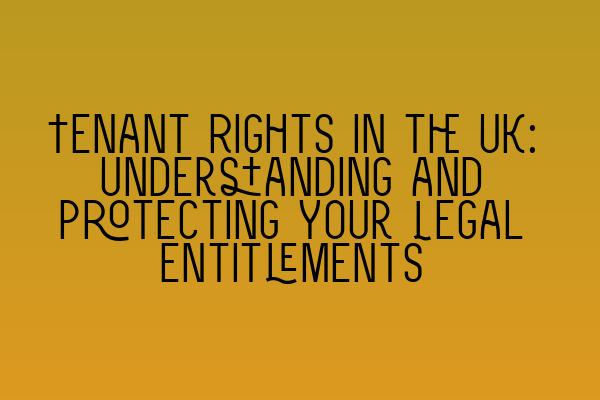Tenant Rights in the UK: Understanding and Protecting Your Legal Entitlements
Introduction:
As a tenant renting a property in the UK, it is essential to understand your rights and legal entitlements. Knowing your rights not only empowers you but also helps you navigate the complex landscape of renting in the UK. This blog post will provide a comprehensive overview of tenant rights in the UK, including key laws and regulations that protect your interests. Whether you are a new renter or have been renting for years, this information will be invaluable in ensuring you are fully aware of your rights as a tenant.
The importance of tenant rights:
Tenant rights in the UK are crucial to ensure fair treatment and protection for individuals who rent properties. These rights cover various aspects, such as fair rent, security of tenure, maintenance and repairs, and protection against discrimination. Understanding and asserting your rights as a tenant will benefit you in the following ways:
1. Security and stability: Tenants have a right to security of tenure, which means they can enjoy a stable living arrangement without the fear of arbitrary eviction or unreasonable rent increases.
2. Fair treatment: Tenant rights protect you from discrimination based on factors such as age, disability, gender, religion, and more. It ensures that no one can deny you a property or treat you unfairly due to such attributes.
3. Living conditions: Tenants have the right to live in a safe, habitable, and well-maintained property. Landlords are obligated to address maintenance and repair issues promptly to maintain a decent standard of living for tenants.
4. Dispute resolution: Understanding your rights as a tenant equips you with the knowledge to resolve any disputes or conflicts that may arise with your landlord. It helps create a fair and balanced relationship between tenants and landlords.
Key tenant rights in the UK:
1. The right to a written tenancy agreement:
– A written tenancy agreement sets out the terms and conditions of the tenancy, including the rent amount, duration, and responsibilities of both the tenant and landlord.
– It is essential to carefully review the agreement before signing and seek legal advice if needed.
2. Protection against unfair eviction:
– Tenants are protected from unfair eviction, and landlords must follow the correct legal procedures to terminate a tenancy.
– In most cases, landlords must provide notice and obtain a court order before evicting a tenant.
3. Rent control and restrictions:
– Rent control measures exist in certain areas to prevent landlords from charging exorbitant rents. These restrictions ensure that rents remain reasonable and affordable for tenants.
4. Repairs and maintenance:
– Landlords have a legal duty to maintain the property in a good state of repair and ensure it meets health and safety requirements.
– Tenants should promptly report any maintenance issues to their landlords and follow up if repairs are not completed satisfactorily.
5. Protection against discrimination:
– Tenants have the right to be treated fairly and equally. Landlords cannot discriminate against tenants based on protected characteristics, such as race, disability, or sexual orientation.
6. Deposit protection:
– Landlords are required by law to protect tenants’ deposits in a government-approved tenancy deposit scheme.
– Deposits must be returned to tenants at the end of the tenancy, provided there are no damages or outstanding rent.
7. Privacy and quiet enjoyment:
– Tenants have the right to enjoy their rented property without unnecessary intrusion from the landlord.
– Landlords must give proper notice before entering the property, except in cases of emergencies.
Knowing and enforcing your rights:
To effectively protect your rights as a tenant, it is crucial to:
1. Familiarize yourself with the relevant laws:
– Understanding the legal framework surrounding tenant rights in the UK will provide you with a solid foundation to assert and protect your entitlements.
– The Landlord and Tenant Act 1985 and the Housing Act 1988 are key legislations that govern tenancy rights in the UK.
2. Keep documentation:
– Maintain copies of important documents, such as your tenancy agreement, rent receipts, and communication with your landlord.
– These documents will serve as evidence in case of any disputes or legal actions.
3. Seek legal advice when needed:
– If you are unsure about your rights or believe your landlord has violated them, seeking legal advice from a property law solicitor is recommended.
– A solicitor can guide you on the best course of action and help resolve any issues in a fair and legally sound manner.
Conclusion:
Understanding and protecting your tenant rights in the UK is essential for a smooth and fair renting experience. By being aware of your legal entitlements, you can ensure a secure living arrangement, fair treatment, and proper resolution of any disputes that may arise with your landlord. Remember to familiarize yourself with the relevant laws, keep documentation, and seek legal advice when necessary. With this knowledge, you can confidently assert your rights as a tenant and maintain a positive landlord-tenant relationship.
Related Articles:
– SQE 1 Practice Exam Questions
– SQE 1 Practice Mocks FLK1 FLK2
– SQE 2 Preparation Courses
– SQE 1 Preparation Courses
– SRA SQE Exam Dates
